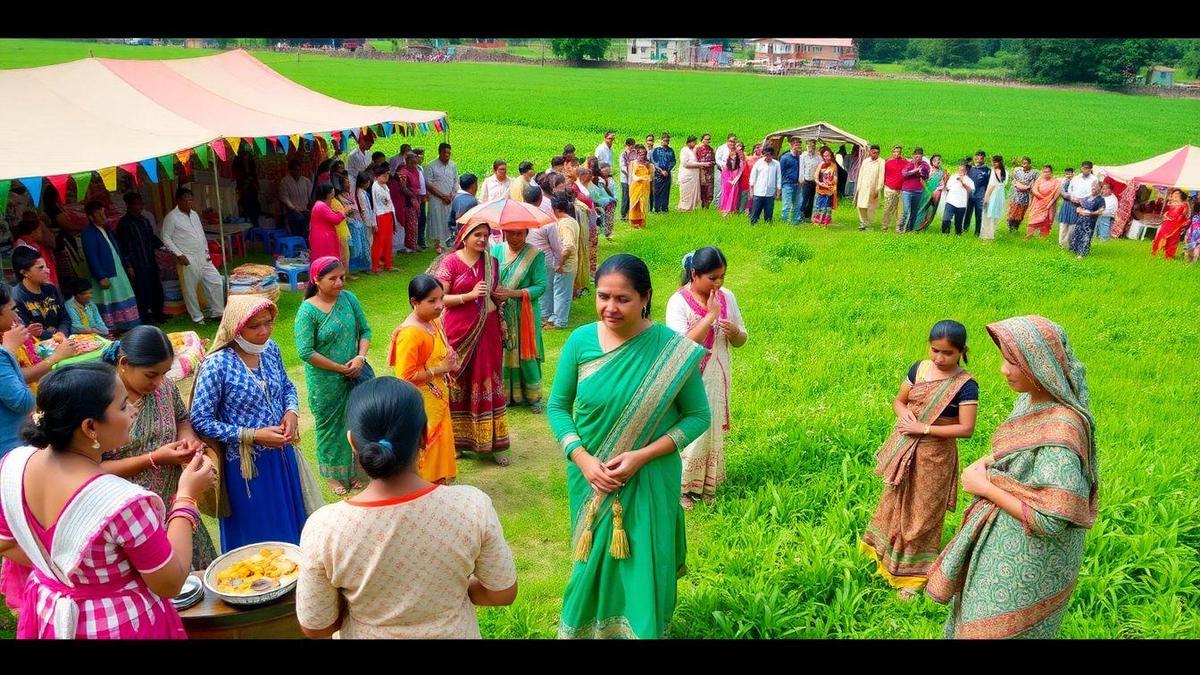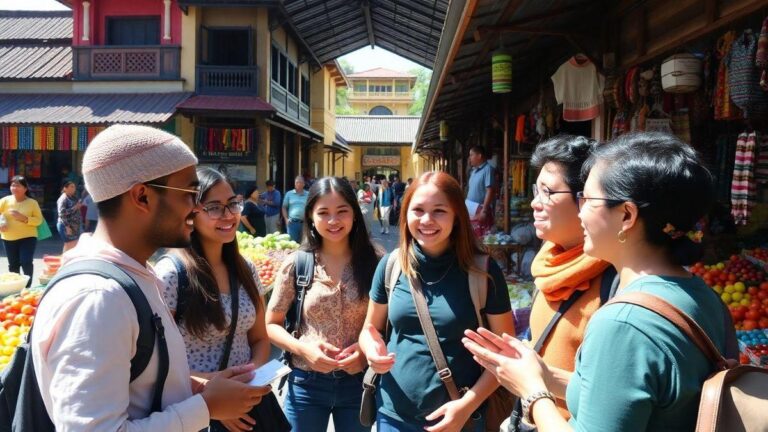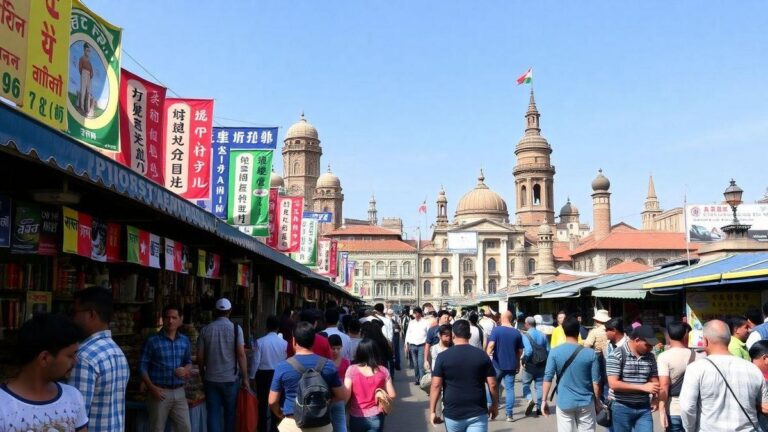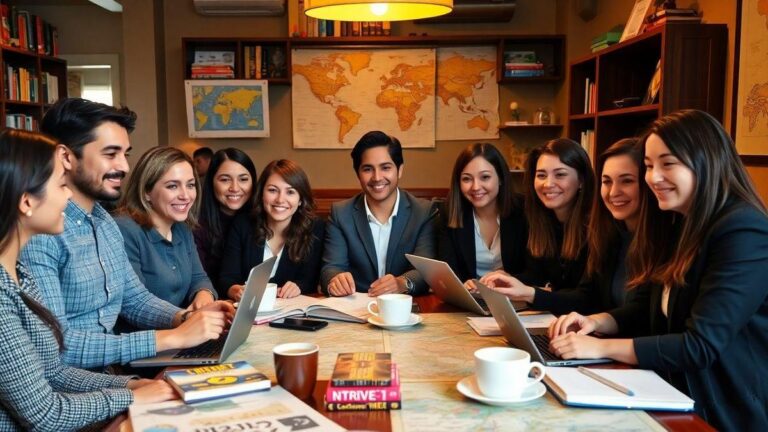Traditional festivals improved by native language participation in rural areas
Traditional festivals improved by native language participation in rural areas bring joy and a sense of community. These celebrations are not just fun events; they play a vital role in preserving cultural heritage. When people use their native languages, they connect with deep-rooted traditions and foster stronger bonds among neighbors. In this article, you’ll explore how language enhances cultural celebrations, revives indigenous traditions, and makes festivals even more special for everyone involved. Get ready to dive into the vibrant world of community festivities and see how language adds a unique flavor!
Key Insights
- Your language connects you to your culture.
- Local festivals unite you with your community.
- Celebrating in your language keeps traditions alive.
- Participation boosts pride in your heritage.
- Learning your native language helps future generations.
The Role of Native Language in Traditional Festivals
Enhancing Cultural Heritage Celebrations
When you think about traditional festivals, what comes to mind? Colorful parades? Delicious food? Now, imagine all of that infused with the native language of the community. Using the local language during these celebrations adds a special touch. It brings people together, making everyone feel more connected to their roots.
For instance, in many rural areas, festivals often include songs and stories told in the native tongue. This practice not only enriches the experience but also helps preserve the cultural heritage. When you hear an elder share tales in their native language, it’s like stepping back in time. You can almost feel the history come alive!
Strengthening Local Dialect Participation
Have you ever noticed how people light up when they speak in their own dialect? It’s a beautiful sight! By encouraging participation in local dialects, festivals become more inclusive. Everyone feels welcomed and valued.
Here’s a quick look at how local dialects can boost participation:
| Benefits of Local Dialect Participation | Examples |
|---|---|
| Increased Engagement | More people joining in on dances |
| Cultural Pride | Community members wearing traditional attire |
| Shared Understanding | Elders teaching youth local traditions |
When you see families laughing and enjoying themselves while using their dialect, it creates a sense of belonging. It’s as if the festival becomes a big family reunion!
How Language Revives Indigenous Traditions
Language is like a bridge that connects generations. When you use the native tongue during festivals, you help revive indigenous traditions. These traditions often hold stories, values, and lessons that are crucial for the community.
For example, during a harvest festival, you might hear stories about the land and its significance. This not only teaches younger generations but also reinforces the community’s bond with the environment. When you participate in these activities, you’re not just a spectator; you’re a part of something bigger.
The Impact of Rural Community Engagement on Festivals
Boosting Festival Tourism with Local Involvement
When you think about festivals, what comes to mind? Joyful celebrations, delicious food, and vibrant music, right? But did you know that local involvement can really boost festival tourism? When community members get involved, they help create a festival that feels authentic and welcoming. Tourists love to experience the real culture of a place.
For example, a small town in your area might host an annual harvest festival. If local farmers showcase their produce and local artists display their crafts, visitors will be drawn in. This kind of authentic experience encourages them to return year after year. Plus, it helps the local economy by bringing in more visitors who spend money at shops and restaurants.
Building Stronger Community Bonds through Celebrations
Festivals are not just for tourists; they also bring the community together. When you participate in planning and celebrating local events, it strengthens your bonds with neighbors. You get to meet new friends, share stories, and create memories.
Imagine a spring festival where everyone contributes a dish for a potluck. The joy of sharing food can create connections that last a lifetime. These celebrations remind us that we are all part of something bigger. Communities that celebrate together grow stronger together.
The Benefits of Grassroots Festival Organization
Grassroots organizations play a crucial role in making festivals successful. They are made up of local people who know the community best. Here are some benefits of this approach:
| Benefits | Details |
|---|---|
| Authenticity | Festivals feel genuine when locals are involved. |
| Cost-Effective | Local volunteers save money on labor costs. |
| Community Pride | People take pride in their culture and traditions. |
| Tailored Experiences | Events can be customized to fit local tastes. |
When festivals are organized by the community, they reflect the true spirit of the area. This leads to a more enjoyable experience for everyone involved.
Preserving Linguistic Diversity in Cultural Events
Celebrating Cultural Identity through Language
Language is a big part of who we are. When you attend a cultural event, you don’t just see colorful costumes and tasty food; you also hear the sounds of your heritage. It’s like a warm hug from your past. Using your native language at festivals helps keep your culture alive. It reminds everyone, young and old, of where they came from.
Imagine a festival where everyone speaks the same language. It feels like a family reunion! You can share stories, jokes, and traditions in a way that feels natural. This connection is a beautiful way to celebrate your identity.
The Importance of Native Language in Festival Activities
When festivals include native languages, it brings a special spark to the activities. Think about games, songs, and dances that are done in your mother tongue. They create a deeper experience. Here’s a quick look at why this matters:
| Activity | Impact of Native Language |
|---|---|
| Storytelling | Engages listeners, making tales more relatable |
| Songs | Evokes emotions and memories tied to your culture |
| Games | Fosters teamwork and understanding among participants |
When you participate in these activities, you’re not just having fun; you’re also passing on traditions to the next generation. It’s a way to keep your community strong and connected.
Fostering a Sense of Belonging in Rural Areas
In many rural areas, festivals are a lifeline for community bonding. When everyone speaks the same language, it creates a sense of belonging. You can connect with your neighbors and share experiences that matter to you.
Think about a local festival where everyone joins in to celebrate together. You can feel the energy in the air! This shared language makes it easier to connect, breaking down barriers and building friendships.
In these settings, you might find that the smiles and laughter you share during a festival can make even the toughest days feel lighter. It’s a reminder that you are part of something bigger, a vibrant community that thrives on its cultural roots.
Frequently Asked Questions
How does native language participation improve traditional festivals?
Native language participation brings people together. It helps you feel connected. You enjoy the culture more when you understand the words and stories. Festivals become livelier and more fun!
Why are traditional festivals important in rural areas?
Traditional festivals celebrate your community’s history. They bring joy and pride. These events keep your culture alive. You get to experience and share unique traditions.
Can kids join in native language activities during festivals?
Absolutely! Kids can learn and have fun. They can perform, sing, or even help out. This way, they connect with their heritage early on. It makes festivals memorable for everyone involved.
How can I support native language use at local festivals?
You can start by using your native language at home. Encourage your friends and family to do the same. Attend events and participate in activities. Your support promotes traditional festivals improved by native language participation in rural areas.
Are there resources to learn the native language for festivals?
Yes, many resources are available! Check local libraries or community centers. You can find classes, books, and online tools. Learning can be enjoyable, especially with friends!

Hey, I’m Paula — traveler, language nerd, and the curious mind behind znewz.com. I’ve always believed that real connections happen through words, gestures, and shared experiences — not algorithms. That’s why I created this blog: to share travel stories from around the world and explore how language helps us connect in ways that AI still can’t. Whether I’m getting lost in a tiny town or striking up a chat in a language I barely know, I’m here to show that sometimes the best moments happen when tech takes a back seat.





